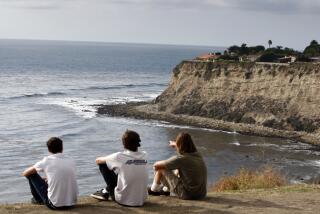Judge Wrests America’s Cup From San Diego
- Share via
A New York judge ruled Tuesday that the San Diego Yacht Club had defended the America’s Cup illegally by using a twin-hull catamaran against New Zealand’s single-hull racing craft last September. The judge stripped San Diego of the sailing world’s top prize and awarded it to New Zealand’s Mercury Bay Boating Club.
The decision by state Supreme Court Justice Carmen Ciparick could be appealed, but in any case it probably scuttles plans for the next competition scheduled for San Diego in the spring of 1991. Mark Smith, a lawyer representing San Diego, said the club is considering such an appeal.
“There is a feeling that we’ve been had,” Smith said.
Next Defense in 1991
Michael Fay, the merchant banker who has financed New Zealand’s sailing and legal battles the last three years, said if there is no appeal or other delays, the next defense would start at Auckland in April, 1991.
Barring another legal turn, San Diego appears to be ruled out as a site for the next race, depriving the city of the estimated $1.2 billion that the 1991 defense was expected to generate.
In her ruling, Ciparick implied that the San Diegans were poor sports for using a catamaran, a craft that by its basic design is inherently faster than a mono-hull--a fact proven when Dennis Conner sailed the 60-foot Stars & Stripes catamaran to two easy victories over its 123-foot rival in the best-of-three series.
Ciparick said that George L. Schuyler, the 19th-Century author of the two-page Deed of Gift, which lays out the terms of America’s Cup races, did not contemplate such a “gross mismatch” between boats. That “mismatch” was Fay’s principal point of contention in bringing the case before the New York court.
Although the Deed of Gift does not specifically prohibit catamarans, Ciparick wrote in her ruling, “The court finds that the intent of the donor, as expressed in the Deed of Gift, was to exclude a defense of the America’s Cup in a multi-hulled vessel by a defender faced with a mono-hulled challenge.
“Barely paying lip-service to the significance of the competition, (San Diego’s) clear goal was to retain the cup at all costs so that it could host a competition on its own terms. San Diego thus violated the spirit of the deed.
“The holder of the America’s Cup is bound to a higher obligation than the victor of the Stanley Cup or the Super Bowl.”
Ciparick upheld the petition filed in November by Fay claiming that San Diego was obligated to defend the cup in a boat similar to the big mono-hull he had declared in his original challenge of July, 1987--five months after Conner brought the America’s Cup back to the United States from Australia.
The announcement of Ciparick’s long-awaited decision came in the early morning in Auckland and set off impromptu celebrations throughout the city of 1 million, which calls itself “the city of sails” because of the high interest in the sport. Joggers stopped their early morning exercise to discuss the news, and a fireboat motored into Auckland Harbor to spray its hoses.
Fay, who has donated his personal time to a dogged pursuit of the America’s Cup, was awakened by a phone call from aide Alan Sefton, who told him of the decision. Then Fay went for his own morning jog, receiving congratulations from his countrymen along the way.
“The America’s Cup is the winner,” Fay said. “The deed works.”
Both San Diego and New Zealand were progressing with plans to stage a 1991 defense, under an informal understanding that the 25 challenges from 11 countries--including the Soviet Union for the first time--would be routinely transferred to the new defender.
More to Read
Sign up for Essential California
The most important California stories and recommendations in your inbox every morning.
You may occasionally receive promotional content from the Los Angeles Times.













